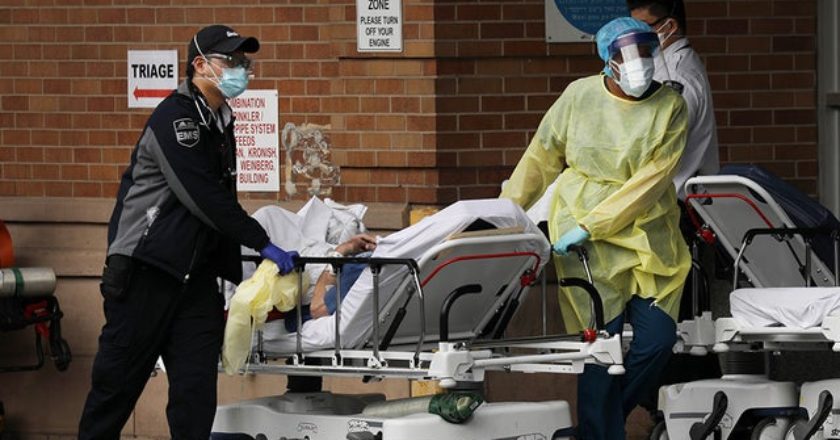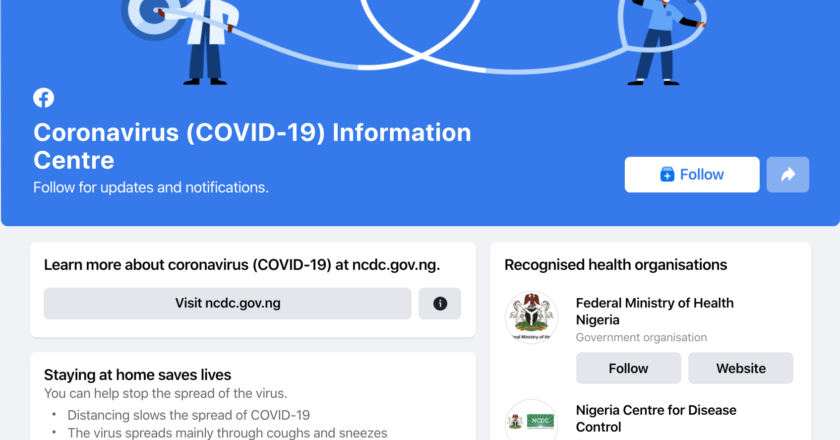


Opinion: Africa cannot go back to ‘business as usual’ when COVID-19 pandemic is over | By: Babatunde Omilola
Like every other pandemic that the world has experienced in the past, coronavirus will eventually come to an end. It will be defeated, and life return to normal. But it will teach us an important lesson: the need to invest in health infrastructure across the world, and particularly in Africa.
For centuries, global and national agendas have given premium to wealth creation and less attention to healthcare. Indeed, the pursuit of wealth has even come at the expense of the environment. Budgetary allocations for health have been woefully inadequate compared to other sectors. Just imagine this: if what we are experiencing today was a virus that attacked machines and not human beings, normal life would go on – handshakes, kisses and hugs would still symbolise friendship, love and comfort and not the threat of infection. From now on, we must prioritise human health collectively, not individually.
Globally, as at 6 April 2020, there have been 1,174,866 confirmed cases of COVID-19, including 64,541 deaths, reported to the World Health Organization (WHO). We may not have reached the apex of this pandemic, and what we have seen so far from other countries suggests that Africa is a ticking time bomb. If advanced economies like Italy, Spain, the United States and France are struggling to contain the wrath of this pandemic, then it has a devastating potential in poor countries like Uganda, Cameroon, Burkina Faso and Senegal, where lifestyle, beliefs, culture and economic conditions offer fertile grounds for disease to thrive.
One would have thought that the Ebola outbreak, which began in 2014, would have opened the eyes of key stakeholders in Africa to consider health system strengthening as a key priority. But this has not been the case. At the beginning of the Ebola epidemic, fear and panic prompted some African governments to pay attention to shoring up their health systems, yet, when the grip of the epidemic loosened, business as usual continued.
Also Read: Opinion: The pandemic is no time for fiscal distancing | By: Akinwumi Adesina
Africa cannot afford to go back to business as usual when the COVID-19 pandemic is finally halted. Such an attitude would be akin to settling down to sleep while our roof is on fire. There are too many health issues to be fixed – from an inadequate number of health care professionals to a lack of health infrastructure.
At present, Africa is home to more than 1.3 billion people and bears one-third of the global disease burden yet accounts for only 3% of the global health workforce. The average physician density in sub-Saharan Africa stands at two doctors per 10,000 people. This ranges from 0.6 in Burkina Faso to nine doctors in South Africa. Nigeria, which is the most populous nation in Africa, has physician density of three doctors to 10,000 population. Ethiopia has just one doctor per 10,000 people, even though it has the second largest population on the continent. In contrast, Italy, France and Spain, where COVID-19 is taking its heaviest toll, have physician densities of 40.9, 40.6 and 32.3 doctors per 10,000 population respectively.
There is also a huge health infrastructure gap. An assessment by WHO regarding the status of health infrastructure across the continent revealed woefully inadequate physical health infrastructure. Dispensaries and health centres are limited in supply. The shortage of these facilities makes access to primary healthcare a challenge to most rural residents. For instance, total hospital density per 100,000 population across the continent ranges from 0.06 to 0.17. The number of hospital beds, including intensive care unit (ICU) beds, are limited. A country like South Africa, even with its advanced public health systems has less than 1,000 ICU beds. In Malawi, 17 million people rely on only 25 ICU beds. Countries like Zimbabwe and Liberia have none.
Laboratory capacity in most African countries are equally bereft of modern facilities. The emergency medical systems across many countries in Africa can only deal with a fraction of those needing care. In some deprived communities in Burkina Faso, women requiring emergency care are sometimes transported on bicycles to health centres. Similar conditions can also be found in Chad, Central African Republic, northern Ghana and some rural parts of Nigeria. At the moment, the United States is battling with a limited supply of ventilators for COVID-19 patients. In Africa, very few countries can boast of having even 100 ventilators. There is an urgent need, therefore, to pay attention to health system strengthening in Africa.
Investing in quality health infrastructure makes sense from both economic and social perspectives. Indeed, there is enough evidence that shows that investments in health infrastructure create an avenue for resilient societies and drive inclusive growth. Development partners have a role to play. They can prevent the collapse of health systems in Africa by establishing special funding schemes to support the health expenditures of African countries. These must, however, be targeted and well defined. The support should aim to avoid overstretching existing health infrastructure while strengthening human resource capacity.
The starting point should be investments in digital health tools. Breakthrough innovations such as telemedicine, mHealth and drones are transforming healthcare in advanced countries, meanwhile their adoption in Africa have been rather slow. Supporting the scaling up of these technologies in Africa could help governments deal effectively with epidemics and the growing burden of chronic diseases. Supporting the construction of health posts, the purchasing of personal protective equipment and equipping medical centres with modern facilities can follow. There is no time to waste: while finding ways to battle the current pandemic may be daunting, it also presents an opportunity to focus on the strengthening of Africa’s health systems by adopting a comprehensive and integrated approach based on each country’s individual needs. Let us not go back to business as usual after this pandemic.
Babatunde Omilola is the Manager for Public Health, Security and Nutrition Division at the African Development Bank.

Facebook launches Coronavirus Information Center in Nigeria and 16 other African countries.
Facebook is expanding its Coronavirus Information Center to 17 more countries in sub-Saharan Africa. The Information Centers form part of Facebook’s effort to help the global fight against COVID-19 by providing people with the latest news and information from trusted health authorities as well as resources and tips to stay healthy and support their family and community.
Also Read: Covid-19: The world’s largest critical care unit unveiled in London.
The Coronavirus (COVID-19) Information Center is featured at the top of News Feed, that provides a central place for people to keep informed about the Coronavirus. It includes real-time updates from national health authorities and global organisations such as the World Health Organization, as well as helpful articles, videos and posts about social distancing and preventing the spread of COVID-19.
Facebook users can opt in to follow the center to get notifications and see updates in their News Feed from official government health authorities.
The center has already launched in South Africa, it will now be expanded to the following new sub – Saharan African markets:
- Benin
- Burkina Faso
- Cameroon
- Cape Verde
- Chad
- Côte d’Ivoire
- Ethiopia
- Gabon
- Guinea
- Kenya
- Mali
- Mauritania
- Nigeria
- Senegal
- Seychelles
- The Democratic Republic of Congo (DRC)
- Togo
Facebook’s Head of Public Policy, Africa, Kojo Boakye comments about the expansion; “We’ve built the information centers, in collaboration with national health partners, to ensure that people can get access to information from trusted health sources. The launch of the COVID-19 Information Center on Facebook in more than 17 countries across sub-Saharan Africa aligns with our commitment to making accurate, timely information about the pandemic accessible to all communities.”
Also Read: Places in the world with no case of the Covid-19.
There are now 1.5 million known coronavirus cases worldwide. According to Africa News, In Africa, there’s Coronavirus in 52 African countries, 11,400+ cases, 574 deaths, 1,405 recoveries.
Major stats as at April 9
Confirmed cases = 11,440
Number of deaths = 574
Recoveries = 1,405
Infected countries = 52
Virus-free countries = 2
Countries in alphabetical order
Algeria – 1,572
Angola – 19
Benin – 26
Botswana – 6
Burkina Faso – 414
Burundi – 3
Cameroon – 730
Cape Verde – 7
Central African Republic – 8
Chad – 10
Comoros – 0
Congo-Brazzaville – 45
DR Congo – 180
Djibouti – 135
Egypt – 1,560
Equatorial Guinea – 18
Eritrea – 33
Eswatini – 12
Ethiopia – 55
Gabon – 34
(The) Gambia – 4
Ghana – 313
Guinea – 164
Guinea-Bissau – 33
Ivory Coast – 384
Kenya – 179
Lesotho – 0
Liberia – 31
Libya – 21
Madagascar – 93
Malawi – 8
Mali – 59
Mauritania – 6
Mauritius – 273
Morocco – 1,275
Mozambique – 17
Namibia – 16
Niger – 342
Nigeria- 276
Rwanda – 110
Sao Tome and Principe – 4
Senegal – 244
Seychelles – 11
Sierra Leone – 7
Somalia – 12
South Africa – 1,845
South Sudan – 2
Sudan – 14
Tanzania – 25
Togo – 70
Tunisia – 628
Uganda – 53
Zambia – 39
Zimbabwe – 11

WHO concerned as COVID-19 cases accelerate in Africa
With more than 6000 COVID-19 cases reported in Africa, the virus is threatening fragile health systems on the continent. Infections are increasingly spreading not only between African countries but within different localities in the hardest-hit countries.
For instance, in the Democratic Republic of the Congo, where COVID-19 cases were at first confined to Kinshasa, now a handful of cases have been reported in the easternmost regions of the country that were until recently in the grip of an Ebola outbreak. In South Africa, all provinces have now reported cases. The outbreaks in Burkina Faso, Cameroon and Senegal are also widespread.
“It’s also crucial that the international community promptly provide the considerable funding needed to maintain and scale up assistance programmes.”
As well as ensuring basic needs are met, WHO is pursuing innovative solutions to the region’s pressing public health problems. On 1 April 2020, WHO hosted an online training session on the clinical management of COVID-19 cases. Nearly 500 attendees from across Africa logged in to learn about issues including case characterization and triage, treating severely ill cases, infection prevention and control, and how to quarantine and manage cases in the community. WHO also hosted a three-day ‘hackathon’, bringing together Africa’s brightest minds to find solutions to some of the problems COVID-19 has presented.
“Case numbers are increasing exponentially in the African region,” said Dr Matshidiso Moeti, the World Health Organization (WHO) Regional Director for Africa “It took 16 days from the first confirmed case in the Region to reach 100 cases. It took a further 10 days to reach the first thousand. Three days after this, there were 2000 cases, and two days later we were at 3000.”
To contain COVID-19, many countries in Africa are implementing measures, which restrict gatherings and the movement of people. Nationwide lockdowns are in effect in Kenya, Uganda, the Republic of the Congo and elsewhere. However, governments must use these measures in a considered, evidence-based manner, and make sure that people can continue to access basic necessities.
As many people in the region live in crowded conditions or work in the informal sector and need to earn money daily to survive, it is important that countries make provisions to ensure that people can still access essential services. WHO is working closely with national governments and United Nations partners including the World Food Programme (WFP) to plan for these needs.
Dr Moeti and Ms Lola Castro, the WFP Regional Director for Southern Africa, addressed the restrictive measures during a virtual media briefing held today by the WHO Regional Office for Africa with the support of the World Economic Forum.
“For socially restrictive measures to be effective, they must be accompanied by strong, sustained and targeted public health measures that locate, isolate, test and treat COVID-19 cases,” Dr Moeti pointed out.
“It’s vital that ports continue to operate to receive food and other essential humanitarian cargo; that borders and roads stay open so it can be moved where it is most needed; and that distributions to vulnerable people are conducted safely,” said Ms Castro.
Jubilation as WHO declares Sierra Leone ebola-free
There were scenes of jubilation on the streets of Sierra Leone this morning, as the World Health Organization (WHO) delcared the country Ebola-free after 42 days with no new cases. The country will now enter a 90-day period of heightened surveillance to make sure the virus does not return. The National Ebola Response Centre (NERC) will continue to operate until the end of the year.
“For us, Ebola is not over. We need your help to treat the many many health problems we still suffer from. And remember those who died at the hands of Ebola, and especially the children who have ben affected by this outbreak,” Yusuf Kamara, a survivor who lost 16 members of his family said.
Sierra Leone recorded the first Ebola case in May 2014, 8,704 people were infected and 3,589 have died from the fatal illness.
Breaking! World Health Organization (WHO) officially declares Nigeria Ebola-free
Nigeria Declared Ebola-Free
Ebola: Nigeria endorses use of Zmapp experimental drug for treatment.
Zmapp, the experimental Ebola drug, for treatment of patients infected with the Ebola Virus Disease (EVD) has been approved by the National Health Research Ethics Committee, Nigeria.
In a statement issued to newsmen by Prof. Clement Adebamowo, Chairman of the committee on Wednesday in Abuja, the decision by the committee is coming on the heels of Tuesday’s approval by the World Health Organisation (WHO) on the use of Zmapp for treatment of Ebola patients.
“It is ethical to use these treatments in the current situation without first submitting an application to National, State or Institutional Health Research Ethics Committee for prior review and approval. In addition, the Committee waives the current requirement that international shipment of any biological samples out of Nigeria should be preceded by the establishment of a Materials Transfer Agreement.
“This waiver is to promote rapid international response to this global emergency,” the statement said.
In the statement, the Nigerian National Code for Health Research Ethics emphasised that all innovative and non-validated treatments should be carefully and adequately documented.
According to the statement, the documentation can form the basis for clinical trials of the efficacy and side effects of the treatment according to established scientific principles.
In the statement, the ethics committee enjoined all agencies, development partners and research scientists to follow the guideline for the rapid resolution of the current emergency.
“The guideline will contribute to preparedness in case of future occurrences and contribution to scientific knowledge.
“It must be noted that all Phase O and Phase I Clinical Trials that may subsequently be designed for treatment of this infection can be approved only by the National Health Research Ethics Committee,” it said.